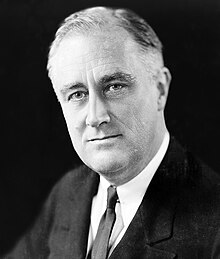Sunday, March 11, 2012
LAD #34
December 7th, 1941, a day that will live in infamy are the famous words that made FDR's declaration of war so memorable. In his declaration of war he stated that the United States had tried to keep relations with Japan peaceful and were given a message from Japan an hour before the attack that gave no intentions of war from Japan. He said given the proximity of Hawaii it is doubtless that this attack had been planned for days, if not weeks. He also said that Japan attacked several other Pacific Islands, which means they have no intentions of stopping expanding their empire. He said that the United States will not rest until it can ensure the safety of its proud citizens.
Monday, March 5, 2012
LAD #33
President Franklin D. Roosevelt took over the presidency of the United States in 1933 during the Great Depression. In his first inaugural address he asked the country to stay as calm and composed as possible, telling the people that "We have nothing to fear but fear itself". He addresses the financial and material struggles that America was having at the time, but he also reminds them that they still have much to be thankful for. He tells them that America's wealth should not lie in the material possessions but in their determination, integrity, and hard work. He says that the number one priority is to get people working again as unemployment was over 25%. He also says that banks need to be regulated and that speculation with other's money must be ended. He concludes by saying that persistence and dedication will cause the United States to get through the Depression however rough it may be.
Sunday, March 4, 2012
LAD #32
The Kellogg Briand Peace Pact was signed in Paris in 1928 by several of the most powerful countries in the world, as well as many smaller countries. The terms of this treaty stated that no country would use war as a means to settle any dispute and that for now on everything would be settled peacefully. The United States were placed in charge of sending copies to all the present countries and in charge of notifying other countries of their ratification.
Sunday, February 12, 2012
LAD #31
President Wilson made his Fourteen points address to Congress after Russia pulled out of WWI, leaving the Allies with a loss on the Eastern front. The Russians ended their participation in the war by signing the Treaty of Brest-Litovsk, leaving Britain and France to fight the Central Powers themselves. Wilson admired the publicity he thought it gave to the triumphs of democracy, but he also questioned how valid the treaty was, as it allowed Russia to lose no land. Because of this misconception Wilson declares it is the duty of the United States to join the war so that they could preserve the integrity of democracy and justice in the world. The simple plan Wilson had for the world was to create peace and order. His points to make this possible were to end secret treaties, free the seas, remove economic barriers, self-determination for colonies, peaceful division of Austria-Hungary and the Balkan States, a League of Nations, and some other points.
LAD #30
In 1918 Schenck was charged with violating the Espionage Act by mailing out pamphlets to draftees into WWI urging them to protest the draft. Schenck argued that he was protected by hi First Amendment rights of freedom of speech and petition. But the Supreme Court, led by Justice Oliver Holmes, ruled that they did not protect him in this case because during war time it posed an immediate danger to the country and said that being during wartime they were evils Congress had the power to protect against.
Saturday, February 4, 2012
LAD #29
The Keating-Owen child labor act was created in response to an outcry from the public that the 1900 census revealed over two-million children were employed on the streets, in factories, and in mines. In 1908 Lewis Hines was hired to photograph children while working, and in 1916 the Keating-Owen Act was passed. The act prohibited the sale of goods from companies employing children under the age of 14. However the law was deemed unconstitutional two years later by the Supreme Court because they deemed that the federal government was overstepping its power to regulate interstate commerce. As a result the government would struggle for a few more years to find an effective way to regulate child labor.
LAD #28
Woodrow Wilson begins his first inaugural address by complimenting the country on its industrial success and political integrity. But he then states that Americans have become wasteful and that the spiritual and physical costs of natural energy and human life have not been effectively evaluated.Wilson is claims that the United States Government is not doing its duties to properly protect its citizens. He says that the great United States government took too long to react and was taken advantage of by few citizens for their own gain.Wilson says that the government must respond to this and fix the problem to help the general public. He reminds the American public that the governments duty is to serve both the humble and the powerful, using both justice and fair play. He says that an unfair tariff, corrupt banks and currency, and misuse of natural resources are all issues that need to be addressed. He concludes his speech by giving a call for patriotism from the American Public.
Subscribe to:
Posts (Atom)






